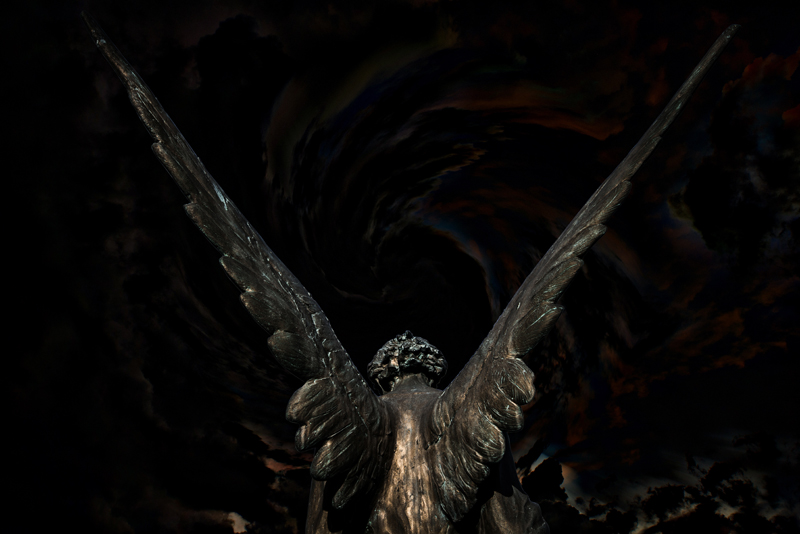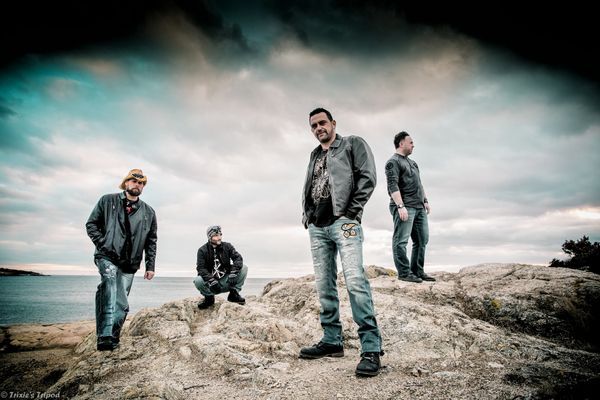Interview - Ana Kefr - Third installment

Morley: How long have you playing and what were some of your pre-Ana Kefr bands like?
Bryce: I've been playing the drums for almost six-and-a-half years now, but it has only been the last two or three that I've really been serious about making it a career. My pre-Ana Kefr bands were pretty ridiculous. Before Rhiis moved to Egypt, he and I played with a few friends and it was experimental-metal/circus-music - at least that's the best way to describe it. Once he moved, that band changed its name and went for a heavy-metal/death-metal sound, but we were immature as musicians and hadn't the experience or practice yet to really play our instruments well. It was the most repetitive music I've ever heard.
Kyle: I have been an axe-man ever since I can remember. Growing up, money was tight so I never really got a chance to be serious about it until I was about 15 years old. I must say, I've really only been a musician since Ak because I never really felt that anything else I wrote was so strong. My prior bands consisted of rock and hardcore, alternative style with mostly singing and back-up screams. You can hear this influence with songs like "Takeover," "Branded by Black Water," "Defiant We Stand" and "The Orchid," songs containing pieces of songs and ideas I'd written before Ana Kefr. But adding drums and keys with Rhiis' gnarly death vox - it changes a lot of the aspects of a song from its original form!
Trent: I've been playing guitar for the past 7 years, roughly, but never took it seriously. My mom introduced me to Joe Satriani while I was learning to play and I instantly fell in love with his riffs and the emotion that he perfectly crafts into every song. I had a tape recorder at the time, so I recorded my own solo tape, imitating Joe songs with my own flare, steady rhythms and what I thought were in-key leads and solos. Being from a musically-influenced family, my brother played drums. When my high school put on a Battle of the Bands contest, I asked my bro to play it with me and he said he was down for it. We rocked out knock-off Satch songs at the high school lunch period for 30 minutes and, immediately after, while I was rolling my amp to my truck, two dudes I went to school with approached me and asked me to join their band. They had a singer, drummer, bass and guitar and wanted me to fill out their death-screamo sound with some leads and rhythms. We recorded a 3-track demo but never went anywhere with it because our drummer moved out for college. Later that school year, I met Kyle through friends of friends, and we started talking about guitar and bands that we liked. We have a lot of similar influences with metal and hardcore. It didn't take long before I started jamming with him and the band he had going, which I mentioned earlier. I must say, I always had the dream of rocking out shows and making music day-in, day-out, but was always told that school and education is the road to success, so I never took it seriously. I'm stoked that this is working out for us and I would have never thought that music could take us where we are headed now.
Morley: Lyrically, Rhiis has put some pretty confrontational issues on the plate. Does the whole band share this vision?
Bryce: Yes, we all feel the same way about every song we write. Before our first album was recorded, we actually took about a month to talk and discuss what Rhiis was saying, to make sure we all understood it and agreed. We didn't want to be hypocritical by writing and performing these songs without understanding or agreeing. It wouldn't look very good if the band claimed we're against religion yet every Sunday sat in church. We have to live by our message - how else could we expect anyone else to hear it and take it seriously?


Morley: How does the songwriting work within the band? Does one person come in with a finished song or does everybody just jam it out?
Trent: Songwriting for Ana Kefr is really interesting and non-traditional, in my opinion. Usually, you have one guitarist write all the music and the singer writes all the lyrics. For us, anything brought to the table can be used in one way or another. We keep a list of all the riffs, beats, leads, solos and lyrics and, almost always in our writing process, take something from that list.
We name every part, as well, so we can remember it. "Slow Catheter Dog," "F**ked Up Break Dance from Down Under," "The Fortoggen Riff," "Pan Pizza," and "Bad-ass Mammer-Jammer" are some of the names that we have. Don't ask me what they mean; I only know how they are played. We have built an understanding of compromise and sacrifice; none of us feel that it's our time to "shine" individually or anything like that. There are times that Kyle or I may come up with the bulk of a song, or Rhiis has a whole guitar part thought out, but we all interpret it to make us happy.
Bryce contributes a lot, as well, hence "The Day that Guilt Turned White" having a lot of his riffs. We think strictly about the music because this is a band, not a guitarist and singer with other dudes behind them slaving away. The music my bandmates have come from are bands that I would have never thought I would like or even give the chance to listen to. I have expanded my musical taste and influences tremendously and give thanks to them for doing that. So, in a long and drawn out way to answer your question, I would say that we don't limit ourselves in anything that we do, even in our writing process.
Morley: You’ve gone the indie route for this record. Was this by design or by necessity?
Bryce: In a way, it's both. We didn't have a label backing us or funding the record, so we all worked as much as we could and paid from our pockets to make it. We had discussed labels but we didn't want anything just handed to us. We wanted to really work for our dream so that, in the future, we can look at what we've done and know that we built it with our own sweat and blood.
See the link below for the next part of this interview!
Bryce: I've been playing the drums for almost six-and-a-half years now, but it has only been the last two or three that I've really been serious about making it a career. My pre-Ana Kefr bands were pretty ridiculous. Before Rhiis moved to Egypt, he and I played with a few friends and it was experimental-metal/circus-music - at least that's the best way to describe it. Once he moved, that band changed its name and went for a heavy-metal/death-metal sound, but we were immature as musicians and hadn't the experience or practice yet to really play our instruments well. It was the most repetitive music I've ever heard.
Kyle: I have been an axe-man ever since I can remember. Growing up, money was tight so I never really got a chance to be serious about it until I was about 15 years old. I must say, I've really only been a musician since Ak because I never really felt that anything else I wrote was so strong. My prior bands consisted of rock and hardcore, alternative style with mostly singing and back-up screams. You can hear this influence with songs like "Takeover," "Branded by Black Water," "Defiant We Stand" and "The Orchid," songs containing pieces of songs and ideas I'd written before Ana Kefr. But adding drums and keys with Rhiis' gnarly death vox - it changes a lot of the aspects of a song from its original form!
Trent: I've been playing guitar for the past 7 years, roughly, but never took it seriously. My mom introduced me to Joe Satriani while I was learning to play and I instantly fell in love with his riffs and the emotion that he perfectly crafts into every song. I had a tape recorder at the time, so I recorded my own solo tape, imitating Joe songs with my own flare, steady rhythms and what I thought were in-key leads and solos. Being from a musically-influenced family, my brother played drums. When my high school put on a Battle of the Bands contest, I asked my bro to play it with me and he said he was down for it. We rocked out knock-off Satch songs at the high school lunch period for 30 minutes and, immediately after, while I was rolling my amp to my truck, two dudes I went to school with approached me and asked me to join their band. They had a singer, drummer, bass and guitar and wanted me to fill out their death-screamo sound with some leads and rhythms. We recorded a 3-track demo but never went anywhere with it because our drummer moved out for college. Later that school year, I met Kyle through friends of friends, and we started talking about guitar and bands that we liked. We have a lot of similar influences with metal and hardcore. It didn't take long before I started jamming with him and the band he had going, which I mentioned earlier. I must say, I always had the dream of rocking out shows and making music day-in, day-out, but was always told that school and education is the road to success, so I never took it seriously. I'm stoked that this is working out for us and I would have never thought that music could take us where we are headed now.
Morley: Lyrically, Rhiis has put some pretty confrontational issues on the plate. Does the whole band share this vision?
Bryce: Yes, we all feel the same way about every song we write. Before our first album was recorded, we actually took about a month to talk and discuss what Rhiis was saying, to make sure we all understood it and agreed. We didn't want to be hypocritical by writing and performing these songs without understanding or agreeing. It wouldn't look very good if the band claimed we're against religion yet every Sunday sat in church. We have to live by our message - how else could we expect anyone else to hear it and take it seriously?


Morley: How does the songwriting work within the band? Does one person come in with a finished song or does everybody just jam it out?
Trent: Songwriting for Ana Kefr is really interesting and non-traditional, in my opinion. Usually, you have one guitarist write all the music and the singer writes all the lyrics. For us, anything brought to the table can be used in one way or another. We keep a list of all the riffs, beats, leads, solos and lyrics and, almost always in our writing process, take something from that list.
We name every part, as well, so we can remember it. "Slow Catheter Dog," "F**ked Up Break Dance from Down Under," "The Fortoggen Riff," "Pan Pizza," and "Bad-ass Mammer-Jammer" are some of the names that we have. Don't ask me what they mean; I only know how they are played. We have built an understanding of compromise and sacrifice; none of us feel that it's our time to "shine" individually or anything like that. There are times that Kyle or I may come up with the bulk of a song, or Rhiis has a whole guitar part thought out, but we all interpret it to make us happy.
Bryce contributes a lot, as well, hence "The Day that Guilt Turned White" having a lot of his riffs. We think strictly about the music because this is a band, not a guitarist and singer with other dudes behind them slaving away. The music my bandmates have come from are bands that I would have never thought I would like or even give the chance to listen to. I have expanded my musical taste and influences tremendously and give thanks to them for doing that. So, in a long and drawn out way to answer your question, I would say that we don't limit ourselves in anything that we do, even in our writing process.
Morley: You’ve gone the indie route for this record. Was this by design or by necessity?
Bryce: In a way, it's both. We didn't have a label backing us or funding the record, so we all worked as much as we could and paid from our pockets to make it. We had discussed labels but we didn't want anything just handed to us. We wanted to really work for our dream so that, in the future, we can look at what we've done and know that we built it with our own sweat and blood.
See the link below for the next part of this interview!
You Should Also Read:
Next (fourth) installment of interview
Ana Kefr website

Related Articles
Editor's Picks Articles
Top Ten Articles
Previous Features
Site Map
Content copyright © 2023 by Morley Seaver. All rights reserved.
This content was written by Morley Seaver. If you wish to use this content in any manner, you need written permission. Contact Morley Seaver for details.



